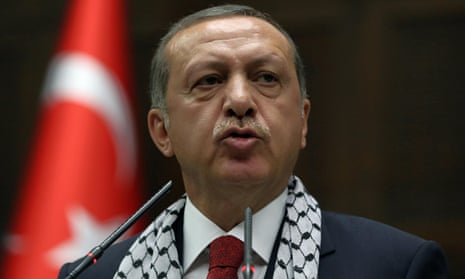Tuesday’s dramatic warning by Turkey’s president that the US-led coalition will fail to stop Islamic State (Isis) fighters overrunning the strategic Syrian Kurdish town of Kobani is the latest move in a tense battle of complaint and counter-complaint between Washington and Ankara. And the only winners so far in this game of moans are the terrorists.
Recep Tayyip Erdoğan, The Turkish president, has come under mounting US pressure to do more to fight Isis. Barack Obama personally leant on him during last month’s UN general assembly in New York. Chuck Hagel, the US defence secretary, and John Kerry, the secretary of state, have both visited Ankara in recent weeks. John Allen, America’s former top general in Afghanistan and now Obama’s anti-Isis envoy, will follow-up in talks beginning on Thursday.
Washington wants Erdoğan to let the US-led coalition use the Incirlik air base in southern Turkey for air strikes, and allow the use Turkish airspace. It is also demanding stricter curbs on the flow of jihadists and terrorist money through Turkey to Syria and Iraq, plus the free movement of foreign forces such as the Free Syrian Army (FSA), which the US is planning to rehabilitate and retrain.
But Erdoğan and his prime minister, Ahmet Davutoğlu, have different priorities. They worry Syria’s civil war will spill into Turkish territory, as it did again briefly this week. They want the utter defeat of the Syrian president, Bashar al-Assad. They are alarmed at the destabilising impact on Turkey of 1.6m Syrian refugees, whose numbers were swollen by 160,000 Syrian Kurds fleeing the fighting around Kobani. They have demanded, and received, assurances from Nato should Turkey come under attack.
The Turkish leaders are also deeply concerned about increased western support for the autonomy-seeking Syrian Kurds, who are the current heroes in the fight against Isis in Syria. Their Democratic Union party (PYD), and its armed wing, the People’s Protection Units (YPG), are affiliated to the predominantly Turkish Kurdistan Workers party (PKK), a proscribed terrorist organisation with which the Turkish state has been at war, on and off, for more than 30 years.
Some in Turkey believe the Kurds are fighting the Islamists with the tacit backing of the Damascus regime, from which they hope to extract political concessions on autonomy further down the road. Quoting government sources, commentator Barçin Yinanç complained US pressure was placing Turkey in an impossible position. “Some want us to make a choice between Isis and the PKK”, she reported Turkish energy minister Taner Yıldız as saying. But Isis and the PKK were “the same” in the eyes of the Turkish government, the minister said.
In another piece of public bickering, Erdoğan demanded and reportedly received an apology from Joe Biden, the US vice-president, who suggested in a speech at Harvard last week that Turkey’s president now regretted his earlier, alleged support for Isis as the spearhead of Sunni Muslim groups in Syria and Iraq. Last month Turkey cut a controversial deal with Isis to free of 49 hostages.
“Securing an apology from the vice-president of the number one superpower is no mean feat of course and gave Ahmet Davutoğlu a convenient opportunity to gloat. He also turned the tables on the US for not listening to Turkey on Syria and allowing things to get out of hand,” said Hurriyet columnist Semih Idiz.
Relations with the US have not reached the low-point of 2003, when Turkey refused to allow US invasion troops to cross its territory into Iraq, but they are undoubtedly strained. As Idiz noted, this may be because “every coalition member has its own agenda and is looking to others to do something that will make a difference on the battlefield”.
Thus while Turkey’s parliament last week agreed to authorise Turkish troops to cross into Syria and Iraq, there is no imminent prospect of them doing so – even if Kobani falls – unless Turkey is directly attacked or the US changes tack dramatically.
Instead, Erdoğan repeated his demand that a buffer area and no-fly zone be set up inside Syria, a demand repeatedly rejected by the US in part because it might be exploited by Turkey’s armed forces to suppress local Kurds. On the other hand, some suggest the US, responding to Ankara’s sensitivities, is deliberately limiting air strikes around Kobani to prevent too great a Kurdish advantage – a dark twist that would give even Machiavelli a headache.
Erdoğan and Davutoğlu insist the coalition’s top priority should be the ousting of Assad, above the destruction of Isis, and that Turkey will only step up its engagement, including deploying troops, if there is a “comprehensive strategy” embracing this aim. If Assad remains, they argue, other extremist groups will simply fill the vacuum if and when Isis is vanquished.
Erdoğan, a tough and stubborn veteran of Istanbul street politics, is often categorised as a western ally. This is a misperception. He is first and foremost a Muslim believer and a nationalist. His vision of Turkey is of an emerging great power and regional leader, independent of the US, the EU and other power blocs. Hence his willingness, for example, to harshly criticise powerful pro-western neighbours such as Israel and Egypt.
Erdoğan’s threefold objective as the Isis crisis unfolds appears to be ensuring Turkey’s security, minimising political and territorial gains by the PKK and Kurds in Syria and Iraq, and advancing the Sunni Muslim cause across the region, primarily by ousting Assad. From these aims he is unlikely to be deflected, whatever Obama says and whatever Isis does.

Comments (…)
Sign in or create your Guardian account to join the discussion